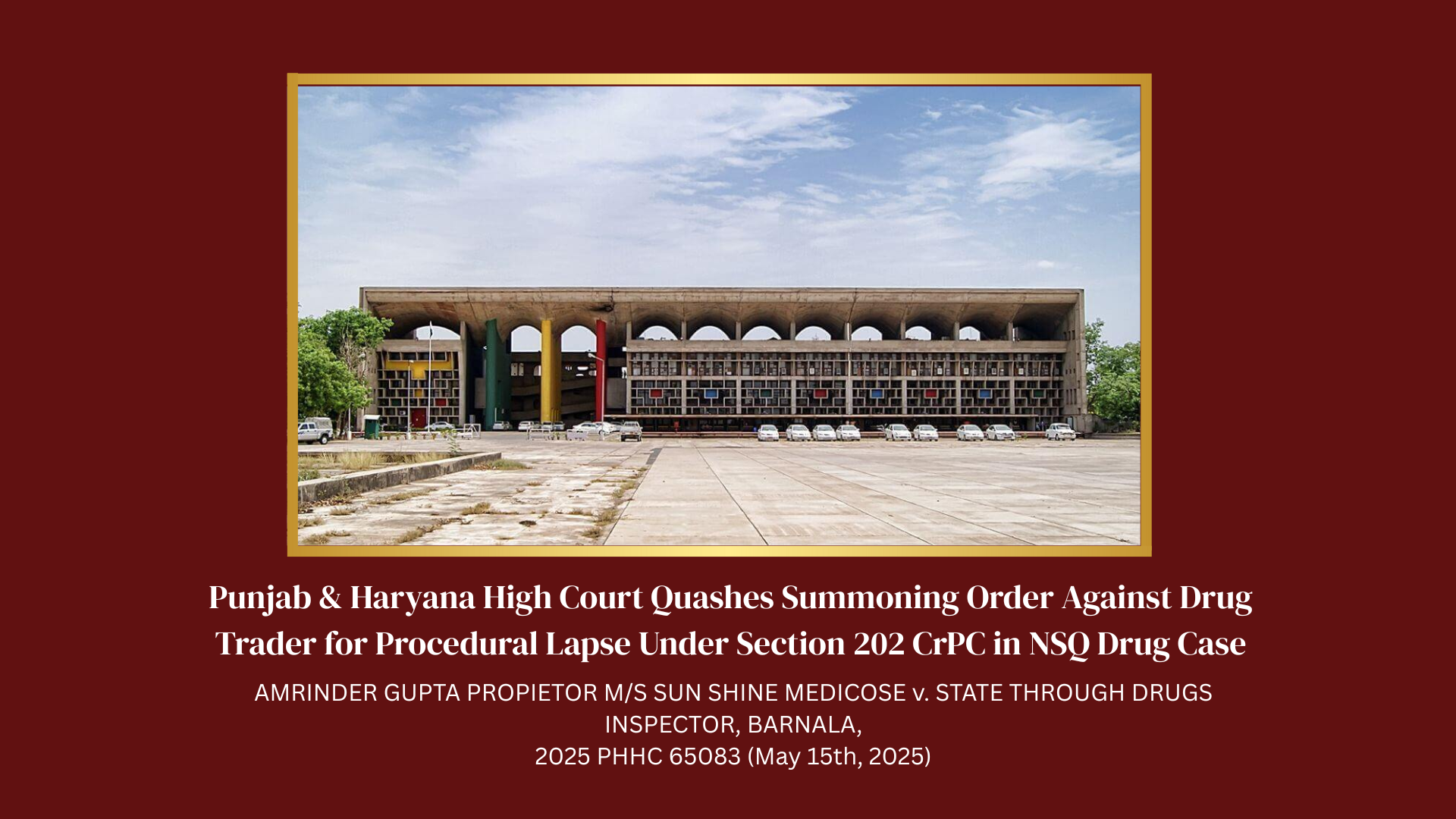
Punjab & Haryana High Court Quashes Summoning Order Against Drug Trader for Procedural Lapse Under Section 202 CrPC in NSQ Drug Case
AMRINDER GUPTA PROPIETOR M/S SUN SHINE MEDICOSE v. STATE THROUGH DRUGS INSPECTOR, BARNALA,
2025 PHHC 65083
May 15, 2025
In the present case, Drug Inspector, Barnala conducted an inspection in S.P. Medicos situated near Civil Hospital, Bhadour District Barnala where Mr Sanjeev Kumar, who is proprietor cum well educated person of the said firm, was present.
The samples of two types of Allopathic Drugs were taken for test and analysis as per Form 17 and the Samples were marked as No. BNL/PS/18/2015 to BNL/PS/19/2015 and four portions of each of these samples were sealed by the same was sent for test and analysis by the Inspector.
Further, the test report declared the sample to be ‘Not of Standard Quality (NSQ)’ because the contents of “Clavulanic acid” has been found to be 2.79 mg/fctab against labeled claim of 125 mg/fctab and it was alleged that that Petitioner has committed an offence U/s 18(a) (i) read with Section 17B, punishable U/s 27 (c) (i) of the Drugs and Cosmetics Act, 1940.
Consequently, the Petitioner approached the Punjab and Haryana High Court for quashing of Criminal Complaint under Section-482 CrPC.
In response, to such allegation the Petitioner stated that he is not the manufacturer, rather he is involved in trading of the drug, which was confiscated and subsequently, found to be of non-standard quality. Moreover, he purchased the said drug from M/s Logos Pharmaceuticals, Delhi and all the manufacturing was done by the said manufacturing company and the transaction has been done from its office at Delhi.
Significantly, the Petitioner further argued that trial Court did not seek the report under Section 202 of Cr.P.C. before issuance of process against the petitioner by passing summoning order dated 02.07.2022.
Accordingly, the High Court after hearing both parties observed that the summoning order dated 02.07.2022 was passed without following the drill of Section 202 of the CrPC.
Further, the High Court referred the judgment of the Supreme Court namely, Abhijit Pawar vs. Hemant Madhukar, 2017(3) SCC 528 where it held as under:
Para 29- “We may like to record that though Mr. Bhatt had refuted the arguments founded on Section 202 of Cr.P.C., even he had submitted that in case this Court is satisfied that mandatory requirement of Section 202 is not fulfilled by the learned Magistrate before issuing the process, this Court can direct the Magistrate to do so.”
Similarly, Dr. Jasminder Kaur vs. Raj Karan Singh Boparai CRM-M-20260-2008, the Punjab and Haryana High Court has held that the drill of Section 202 of the Cr.P.C. is mandatory in nature. The relevant para is quoted as under:
Para 10-. “We are of the view that the High Court has correctly held that the above-mentioned amendment was not noticed by the C.J.M. Ahmednagar. The C.J.M. had failed to carry out any enquiry or ordered investigation as contemplated under the amended Section 202 of the Code of Criminal Procedure. Since it is an admitted fact that the accused is residing outside the jurisdiction of the C.J.M. Ahmednagar, we find no error in the view taken by the High Court. All the same, the High Court instead of quashing the complaint, should have directed the Magistrate to pass fresh orders following the provisions of Section 202 of the Code of Criminal Procedure. Hence, we remit the matter to the Magistrate for passing fresh orders uninfluenced by the prima facie conclusion reached by the High Court that the bare allegations of cheating do not make out a case against the accused for issuance of process under Section 418 or 420 of the Indian Penal Code. The C.J.M. will pass fresh orders after complying with the procedure laid down in Section 202 Code of Criminal Procedure, within two months from the date of receipt of this order.”
Therefore, the High Court allowed the petition and set aside order dated 02.07.2022, the matter is remanded back to learned Chief Judicial Magistrate, Barnala to consider the matter afresh in accordance with law, by taking recourse to Section 202 of the Cr.P.C.
Click here to access the full Judgment
Note:
Cases related to Pharmaceuticals are highly technical and knowledge-driven. If you're searching for a drugs and cosmetics lawyer in India, a pharmaceutical lawyer, Mace Corporate Associates is the perfect place. If you are searching for a DPCO Lawyer for overcharging cases or DPCO Compliance, Mace can assist you well.
May it be a clinical trial Lawyer or a Medical device lawyer, Mace can be of great and perfect match for Pharmaceutical litigation. Mace has an accomplished track record for Not of Standard Quality Cases, Licensing Cases etc.

